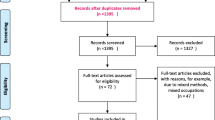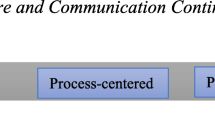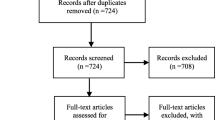Abstract
End-of-life care is an essential element of quality cancer care. Nevertheless, a majority of physicians and nurses working at cancer centers feel unprepared for this task. As part of a larger survey study, we investigated what suggestions experienced physicians and nurses have to improve education/training on end-of-life care. In an open question, participants were requested to suggest changes to the end-of-life curriculum for physicians and nurses. Answers to this question were content analyzed using the qualitative data analysis software MAXQDA. Physicians and nurses at 10 cancer centers throughout Baden-Wuerttemberg were surveyed. From the total 1131 survey participants, 675 (483 nurses, 167 physicians, 25 unknown) responded to the open question regarding suggestions for education/training in end-of-life care. Two main categories were inductively developed: (1) format (i.e., structure and method of teaching) and (2) content (i.e., knowledge and know-how required for care of the dying). Regarding format, both professional groups most often wished for more practical experiences with dying patients (e.g., internships at hospices). Regarding content, physicians and nurses most frequently requested (1) more basic information on palliative care, (2) increased skills training in communication, and (3) knowledge of how to appropriately care for patients’ caregivers. The results of our analysis reflect already trained physicians’ and nurses’ interest in furthering their knowledge and skills to care for dying patients. The suggestions of experienced physicians and nurses should be integrated into the further development of palliative care curricula.
Similar content being viewed by others

References
Spinks T (2012) Ensuring quality cancer care. Cancer J 118:2571–2582
Jors K, Adami S, Xander C et al (2014) Dying in cancer centers: do the circumstances allow for a dignified death? Cancer J 120(20):3254–3260
Alt-Epping B, Jung W, Simmenroth-Nadya A, Russo S, Vormfelde S, Nauck F (2010) Implementierung des Querschnittsfachs Palliativmedizin (Q13) vor dem Hintergrund der neuen gesetzlichen Rahmenbedingungen am Beispiel der Universitätsmedizin Göttingen. GMS Zeitschrift für Medizinische Ausbildung. 27(5):Doc67
Liaison Committee on Medical Education (2013) Functions and structure of a medical school: standards for accreditation of medical education programs leading to the M.D. Degree. http://www.lcme.org/publications/functions2013june.pdf. Accessed 4 Dec 2014
van Aalst-Cohen ES, Riggs R, Byock IR (2008) Palliative care in medical school curricula: a survey of United States Medical Schools. J Palliat Med 11(9):1200–1202
Ausbildungs- und Prüfungsverordnung für die Berufe in der Krankenpflege (KrPflAPrV) (2004) http://www.gesetze-im-internet.de/bundesrecht/krpflaprv_2004/gesamt.pdf. Accessed 4 Dec 2014
End-of-Life Nursing Education Consortium (ELNEC) Fact Sheet (2014) http://www.aacn.nche.edu/elnec/FactSheet.pdf. Accessed 4 Dec 2014
Lloyd-Williams M, Macleod RDM (2004) A systematic review of teaching and learning in palliative care within the medical undergraduate curriculum. Med Teach 26(8):683–690
Gamondi C, Larkin P, Payne S (2013) Core competencies in palliative care: an EAPC White Paper on palliative care education—part 1. Eur J Palliat Care. 20(2):86–91
Gamondi C, Larkin P, Payne S (2013) Core competencies in palliative care: an EAPC white paper on palliative care education—part 2. Eur J Palliat Care. 20(3):140–145
The Hospice and Palliative Medicine Milestones Project (2014)http://acgme.org/acgmeweb/Portals/0/PDFs/Milestones/HospiceandPalliativeMedicineMilestones.pdf. Accessed 16 Oct 2014
Gibbins J, McCoubrie R, Forbes K (2011) Why are newly qualified doctors unprepared to care for patients at the end of life? Med Educ 45:389–399
Gibbins J, McCoubrie R, Maher J, Forbes K (2009) Incorporating palliative care into undergraduate curricula: lessons for curriculum development. Med Educ 43(8):776–783
Dando N, d’Avray L, Colman J, Hoy A, Todd J (2012) Evaluation of an interprofessional practice placement in a UK in-patient palliative care unit. Palliat Med 26(2):178–184
Ferrell F, Virani R, Paice J, Coyle N, Coyne P (2010) Evaluation of palliative care nursing education seminars. Eur J Oncol Nurs 14:74–79
Robinson K, Sutton S, von Gunten CF et al (2004) Assessment of the education for physicians on end-of-life care (EPEC) project. J Palliat Med 7(5):637–645
Gillan PC (2014) End of life care education, past and present: a review of the literature. Nurse Educ Today 34(3):331–342
Dickinson GE (2007) End-of-life and palliative care issues in medical and nursing schools in the United States. Death Stud 31(8):713–726. doi:10.1080/07481180701490602
Lin RJ (2013) The role of palliative care in medical education. Ann Intern Med 159(12):848–849
White KR, Coyne PJ (2011) Nurses’ perceptions of educational gaps in delivering end-of-life care. Oncol Nurs Forum 38(6):711–717
Lamba S, Pound A, Rella J, Compton S (2012) Emergency medicine resident education in palliative care: a needs assessment. J Palliat Med 15(5):516–520
European Association for Palliative Care (2008) Curriculum in palliative care for undergraduate medical education: recommendations of the EAPC. http://www.eapcnet.eu/LinkClick.aspx?fileticket=VmnUSgQm5PQ%3D. Accessed 4 Dec 2014
Engels PT, de Gara C (2010) Learning styles of medical students, general surgery residents, and general surgeons: implications for surgical education. BMC Med Educ 10(1):51
Smith A (2010) Learning styles of registered nurses enrolled in an online nursing program. J Prof Nurs 26(1):49–53
Conrad AC, Muenstedt K, Micke O, Prott FJ, Muecke R, Huebner J (2014) Attitudes of members of the German Society for Palliative Medicine toward complementary and alternative medicine for cancer patients. J Cancer Res Clin Oncol 140(7):1229–1237
Author information
Authors and Affiliations
Corresponding author
Additional information
Abstract previously presented at the German Association for Palliative Care Conference, 2014. Title: “Ausbildung für den Umgang mit Sterbenden: Veränderungswünsche von Ärzten und Pflegenden an baden-württembergischen Tumorzentren”
Rights and permissions
About this article
Cite this article
Jors, K., Seibel, K., Bardenheuer, H. et al. Education in End-of-Life Care: What Do Experienced Professionals Find Important?. J Canc Educ 31, 272–278 (2016). https://doi.org/10.1007/s13187-015-0811-6
Published:
Issue Date:
DOI: https://doi.org/10.1007/s13187-015-0811-6



